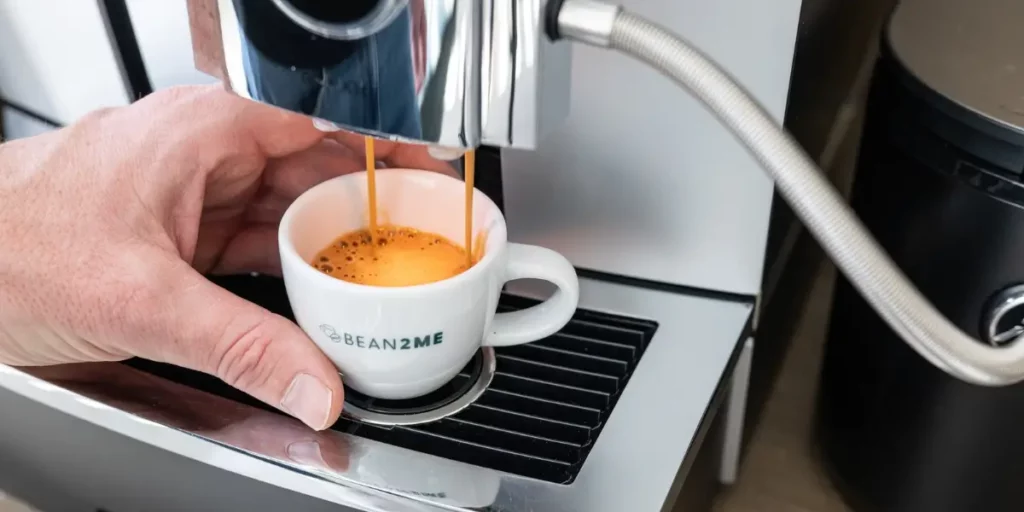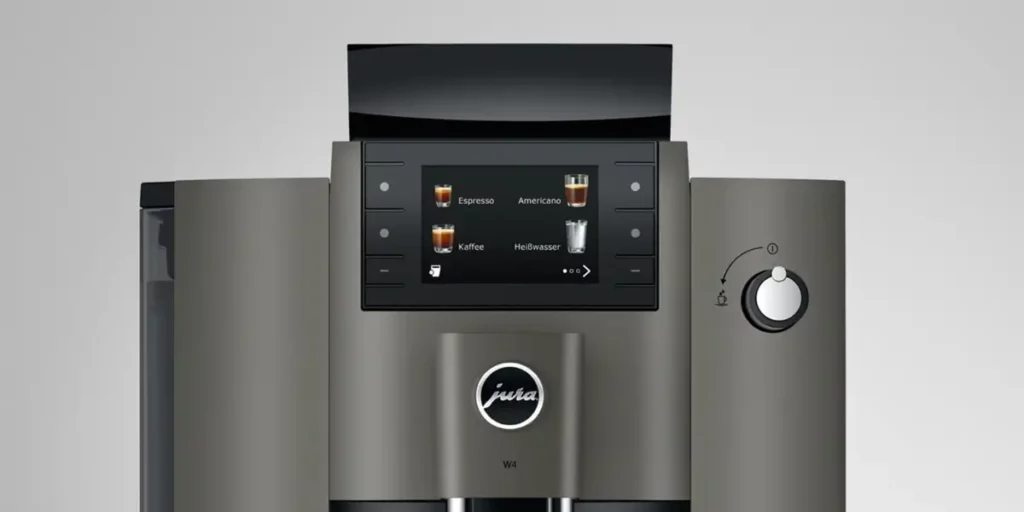The Best Professional Coffee Machine Brands: Complete Guide for Businesses
How do you choose a professional coffee machine suited to your workplace? It’s a question many companies and organizations ask. Beyond price, it’s a true long-term investment that must meet very specific expectations: performance, reliability, design, and build quality.
In this buying guide, we help you make sense of it all. You’ll find the best professional coffee machine brands, as well as the essential selection criteria you need to know before investing: capacity, frequency of use, ease of maintenance, operating costs, but also material quality, durability, and environmental impact.
Choosing the best coffee machine isn’t just a matter of taste. It’s about balancing technical requirements with daily user comfort. Should you opt for an automatic or semi-professional machine? Which brand guarantees consistent extraction and responsive after-sales service? Through this comparison, we’ll guide you toward an informed, sustainable decision that matches your company’s needs.
- Jura Professional – Swiss Automatic Reliability and Durability
- Schaerer – Swiss Precision for High Volumes
- De’Longhi Professional – Italian Solutions for Offices
- Nespresso Professional – Easy to Use, But at What Cost?
- Franke – Premium Innovation
- Eversys – A Newcomer, Still Finding Its Footing
- Conclusion: Which Brand Should You Choose for Your Business?
Jura Professional – Swiss Automatic Reliability and Durability
Jura is an iconic Swiss brand, recognized for its high-end automatic coffee machines. In the workplace, it wins customers over thanks to consistent extraction, refined design, and the robustness of its components. A safe choice for those looking for quality coffee without technical constraints.
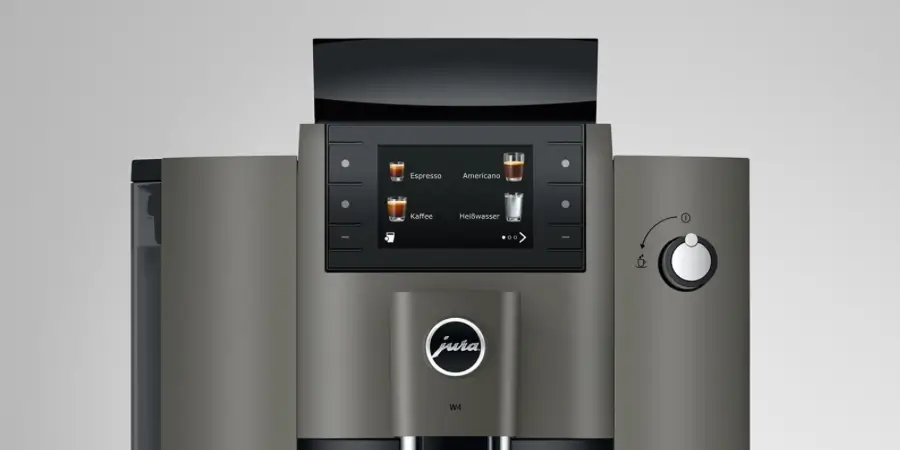
Strengths
Stable and efficient extraction
Thanks to exclusive P.E.P.® and I.P.B.A.S.® technologies, Jura ensures consistent extraction, even under intensive use. Aroma is optimized for every cup, particularly short coffees.
Professional Aroma Grinder
The integrated grinder is fast, quiet, and designed for shared environments. It guarantees a uniform grind suited to high-volume demand.
Automated maintenance
Cleaning, descaling, and rinsing cycles are programmable. The CLARIS Pro Smart system filters water, extending the machine’s lifespan.
Robust materials and perceived quality
Jura uses premium materials such as solid aluminum and stainless steel, with particular attention to finishing. The perceived quality matches its premium positioning.
Reliable repairability
Jura’s after-sales service network is well structured, with good access to parts and a repair-first philosophy rather than systematic replacement.
Recommended models
- W4: For small offices (40 cups/day), compact and simple
- X4: For businesses requiring black coffee only, high autonomy
- X10: With integrated milk system for a variety of beverages
- GIGA X8c: Dual grinder, very high capacity (200 cups/day)
What to know before investing
Jura’s superior quality comes at a price. It isn’t the most affordable solution, but the balance of performance, quality, and cost remains excellent. For large companies with very high consumption, even more powerful models (such as Schaerer or Franke) may be worth considering. But for most workplaces, Jura remains a reliable, durable, and easy-to-integrate choice.
Schaerer – Swiss Precision for High Volumes
Schaerer is a Swiss brand renowned for its ultra high-performance professional coffee machines. Widely adopted by demanding companies, it delivers power, consistency, and perfectly calibrated beverages—even at several hundred cups per day.
Strengths
High-end milk technology
With Best Foam™ and Milk Smart, Schaerer allows you to adjust milk texture and temperature with great precision. The result: stable, customizable barista-quality drinks.
Record professional output
Schaerer offers some of the fastest extraction times on the market. A strategic advantage in industrial environments where breaks are timed, such as in production or logistics. Models support up to 250 cups/day, with automated HACCP cleaning.
Robust and durable construction
Stainless steel, high-resistance components, large tanks: every element is designed to last under intensive use.
Recommended models
- Coffee Club: Compact, 80 cups/day, for small sites
- Coffee Skye: High output, up to 150 cups/day
- Coffee Soul: Versatile, up to 250 cups/day

What to know before buying
Schaerer machines represent an investment of CHF 5,000 to over CHF 20,000, depending on options and configurations. They are difficult to manage without a specialized service provider, unless you have an in-house person dedicated to technical oversight, maintenance, and adjustments. Professional support is strongly recommended.
De’Longhi Professional – Italian Solutions for Offices
Founded in 1902, De’Longhi is an Italian brand well known in the world of consumer automatic coffee machines. For professional environments, it offers a selection of simple, effective, and affordable models, designed for small businesses, freelancers, and shared workspaces. It stands out for its accessible pricing and straightforward positioning.
Strengths
Affordable pricing and easy integration
De’Longhi machines are priced below the professional sector average, generally between CHF 800 and CHF 3,000. They allow companies with limited budgets to offer acceptable daily coffee service without compromising too much on experience.
Versatile functionality
These machines cover essential functions: long coffee, espresso, simple milk drinks like cappuccino (via the LatteCrema Pro system), and hot water for tea. Water tanks reach up to 2 liters depending on the model, sufficient for occasional use.
Comfort and easy maintenance
With removable brew groups, integrated grinder, and auto-cleaning programs, maintenance is simple, even without dedicated technical support. Operation is intuitive, reducing staff intervention.
Professional De’Longhi ranges
- PrimaDonna Soul: A compact filter-style machine, noted for its discretion, fast heating, and modern design. Ideal for small meeting rooms or collaborative spaces.
- La Specialista Maestro Pro: A semi-automatic model with portafilter, powerful steam wand, and manual settings for authentic espresso. Suitable for staff restaurants or café-style spaces.
- ECAM 650.85.MS: Automatic coffee machine with touchscreen, connectivity, and customization options. Its dual spout allows two cups simultaneously. Recommended for medium volumes (up to 50 cups/day).
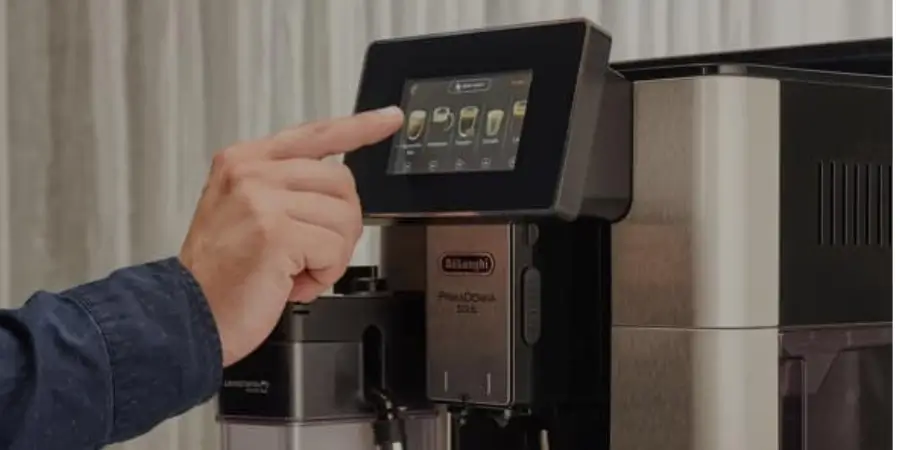
What to know before choosing De’Longhi
De’Longhi is an economical option, but it shows its limits under intensive use. The durability of materials and components is lower than that of premium professional machines like Jura. In case of breakdown, in-depth repairs are rare—the machine is often replaced instead, which may affect customer satisfaction in demanding environments.
De’Longhi is therefore best suited for small businesses looking for a simple, affordable product without heavy technical requirements. It’s a good entry-level option for professional coffee machines, as long as daily consumption volumes are carefully evaluated.
Nespresso Professional – Easy to Use, But at What Cost?
Nespresso Professional, a Nestlé subsidiary, offers automatic capsule coffee machines designed for companies and organizations. While many businesses still appreciate their simplicity, these machines deserve careful evaluation when choosing professional coffee solutions.
Strengths
Consistency… standardized
The capsule system guarantees consistent quality in every cup, regardless of the user. However, this consistency comes at a cost: many coffees are artificially flavored (vanilla, caramel…), and some contain modified extracts. It’s far from specialty coffee. Even with 13 varieties available, it lacks the aromatic richness of freshly ground espresso.
A closed system with high costs
One of the main drawbacks of Nespresso is its closed system: you’re locked into the supplier, with no option to use other coffees. Capsule unit prices may seem affordable, but per kilogram they generally exceed CHF 120—far higher than coffee beans. Add hidden costs: maintenance contracts, outsourced service, exclusive consumables. Frequent machine promotions mask the high overall cost, often equivalent to a complete equipment replacement within 3 years. For budget-conscious businesses, it’s essential to compare true cost per cup, maintenance, service, and autonomy. On these points, Nespresso rarely remains competitive in the medium term.
Recycling: limited impact
Although Nespresso promotes its recycling program, real-world results are limited. Companies must equip themselves, organize collection, and depend on the supplier for treatment. A significant portion of capsules still ends up in regular waste. This system is poorly aligned with zero-waste initiatives or ambitious sustainability policies.
Nespresso Pro models
- Zenius: Compact, simple, designed for low volumes. Suitable for receptions or meeting rooms.
- 100 & 200: Connected machines with touchscreen interface. Quick preparation but limited recipes.
- Aguila: Dual-head, high-capacity model, dedicated to large companies. Capsule-only operation.
Bottom line
Nespresso remains a quick and easy-to-implement solution. But for companies seeking coffee quality, freedom of choice, or cost control, disadvantages quickly outweigh the convenience. Before committing, take time to compare alternatives. And most importantly, ask the right questions: What is the total cost? How satisfied are your employees? What image do you want to project?
Franke – Premium Innovation
Founded in 1911, Franke is a Swiss company specializing exclusively in high-end professional coffee solutions. The brand is recognized for its ultra high-performance machines tailored to demanding corporate environments, large organizations, and multi-site companies.
Strengths
- Industrial-grade reliability: Machines designed to run continuously in demanding workplaces, with components guaranteeing exceptional longevity even under heavy use.
- FoamMaster™ Pro: Advanced technology delivering perfect milk foam with precise temperature and texture control, suited to varied recipes.
- iQFlow™ Business: Intelligent extraction system optimizing every bean for consistent quality, even during peak demand.
- CleanMaster Enterprise: Fully automated cleaning system ensuring HACCP compliance with minimal staff intervention, reducing labor costs.
- Digital Services: IoT platform enabling fleet managers to monitor consumption, stock, and preventive maintenance across all company sites.
Professional Franke ranges
- A300 Series: For SMEs and offices up to 80 employees, 100 cups/day.
- A600 Series: Versatile solutions for mid-sized companies (150–250 cups/day), with customizable 8” touchscreen including logos and corporate colors.
- A800 Series: High-performance machines for headquarters and large enterprises, serving up to 350 cups/day with exceptional speed.
- SB1200 Specialty Beverage Station: Modular system for large companies, combining coffee, hot chocolate, and fresh juices in one station.
Considerations
Franke machines are expensive, and some innovations are perceived as unnecessary add-ons. Their technical complexity can cause breakdowns, and longer extraction times make them less suited to fast-paced workplaces. Schaerer remains a more reliable alternative for most businesses.
Eversys – A Newcomer, Still Finding Its Footing
Eversys is a recent Swiss player in professional coffee machines. Its positioning: blending sleek design, premium materials, and automated barista technology. Acquired in 2021 by Italian group De’Longhi, it has gained international exposure. These machines target businesses wanting to offer a premium coffee experience without a barista.
Representative models
- Eversys Cameo: Compact, designed for coffee shops or premium spaces, with touchscreen and dual heating system.
- Eversys Enigma: Built for high volumes, offering advanced customization and large-scale production capacity.
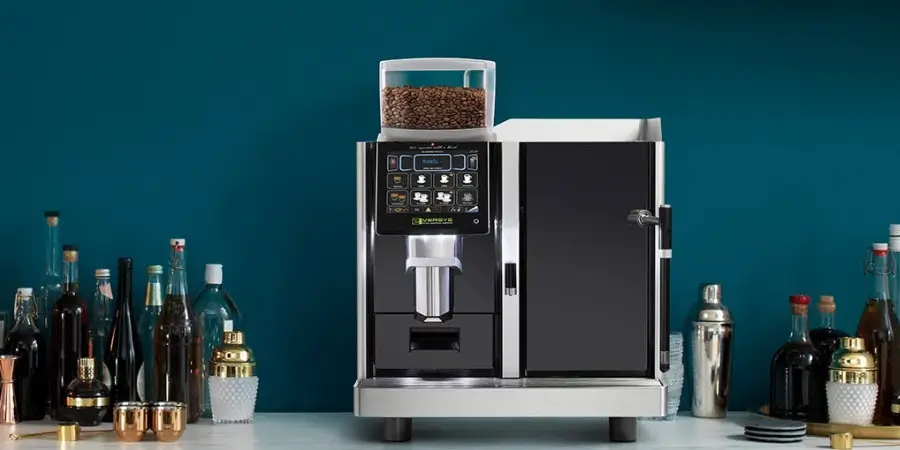
What to know before buying
Despite its Swiss roots, Eversys still struggles to cover the Swiss market effectively. After-sales service remains very limited: sparse technical network, spare parts unavailable locally, and repair delays lasting several months. For now, the brand is difficult to recommend without a very strong external service provider.
Conclusion: Which Brand Should You Choose for Your Business?
Choosing a coffee machine isn’t just about picking a brand and making a quick purchase. It’s about investing in equipment that integrates sustainably into your workplace, spaces, and organizational habits. And it all begins with the right provider.
A serious provider will take the time to ask the right questions: How many employees? What spaces are available? What is your remote work ratio? What are your consumption habits? They may even visit your site to assess technical constraints and propose the most suitable solution.
Most importantly: Are they certified? Can they respond quickly in case of breakdown? Do they provide a replacement machine to ensure continuity of service? Do they keep spare parts in stock? Do they handle repairs directly?
Before the machine, it’s the provider you should choose carefully. Because they determine the reliability, responsiveness, and quality of your coffee experience. Follow their advice on pricing, contracts, and overall operating costs—these are what will make the difference in the long term.
